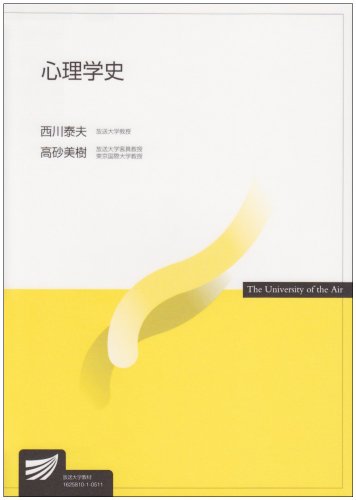55 0 0 0 OA 心理学史におけるLittle Albertをめぐる謎
- 著者
- 高砂 美樹
- 出版者
- 一般社団法人 日本行動分析学会
- 雑誌
- 行動分析学研究 (ISSN:09138013)
- 巻号頁・発行日
- vol.33, no.2, pp.128-134, 2019-02-10 (Released:2020-02-10)
- 参考文献数
- 16
John B. Watsonの条件性情動反応の研究(Watson & Rayner, 1920)に出てくるAlbert B.として知られるLittle Albertは本当は誰だったのだろうか。この9か月齢の子どものことは心理学史ではよく知られてきたが、Albertは実験の後に生後ずっと暮らしていた大学病院から連れていかれ、その後どうなったかについては何の手掛かりもなかった。近年になって、Beck et al. (2009)は、Little Albertは実際にはDouglas Merritteという名前の子どもで、1922年に水頭症を患い、1925年に亡くなっていると主張した。さらに2012年の研究でBeckのグループはAlbertの神経学的障害の徴候を見落としていたと報告し、もしそれが事実であったならばWatsonがこの子どもを虐待していたことになることを示唆した。しかしながら、2014年になると、もう一つのグループの心理学者らがAlbert Bargerという別の子どもをより適切なAlbert B.の候補として同定した。本論ではLittle Albertを探す一連の論争について概観する。
5 0 0 0 OA 20世紀前半における日本の比較心理学の展開
- 著者
- 高砂 美樹
- 出版者
- 日本動物心理学会
- 雑誌
- 動物心理学研究 (ISSN:09168419)
- 巻号頁・発行日
- vol.60, no.1, pp.19-38, 2010 (Released:2010-06-25)
- 参考文献数
- 104
After evaluating the history of comparative or animal psychology in Japan, a development over the past 150 years, four distinct generations of comparative psychologists can be discerned in terms of their active involvement in the field. The zero generation, spanning the second half of the 19th century, was marked by the import of Darwinian evolutionary theory, which was implemented especially through lectures by Edward S. Morse. The first generation appeared in the early 20th century, with Koreshige Masuda heralded as the foremost comparative psychologist during this time. The 1.5-generation researchers were influenced by Gestalt psychology, which had been developed in Europe. The second generation emerged after World War II with the arrival of neobehavioristic psychology. Originated in the U. S., it was studied by comparative psychologists such as C. L. Hull and B. F. Skinner, who considerably influenced Japan's post-war generation. The third generation of comparative psychologists in Japan took root in the 1980s and was characterized by studies of cognitive process. Due to space limitations, the zero and first generations are solely detailed here.
- 著者
- 高砂 美樹
- 出版者
- 東京国際大学
- 雑誌
- 臨床心理学研究 (ISSN:13481223)
- 巻号頁・発行日
- no.7, pp.1-15, 2009
3 0 0 0 OA 日本基礎心理学会創設時を振り返る
2 0 0 0 OA 掲載論文と大会実績からみた日本基礎心理学会30年の歩み
- 著者
- 矢口 幸康 サトウ タツヤ 高砂 美樹
- 出版者
- 日本基礎心理学会
- 雑誌
- 基礎心理学研究 (ISSN:02877651)
- 巻号頁・発行日
- vol.33, no.2, pp.162-166, 2015-03-30 (Released:2015-05-14)
- 参考文献数
- 5
We surveyed the number and the contents of papers published in the Japanese Journal of Psychonomic Society, as well as the society's annual meetings, from 1982 to 2012. Over the course of these 30 years, we found that papers on perception increased in the first decade, followed by an increase in cognitive research, which reflected the shift of the members. Although the time of year and format of the annual meetings were not fixed, a review of the roster showed that greater participation was seen when the meetings were held in fall or winter and/or if they were joint meetings with other societies. The results would contribute to a better management of the society.
- 著者
- 高砂 美樹
- 出版者
- 東京国際大学
- 雑誌
- 東京国際大学論叢. 人間社会学部編 (ISSN:13415042)
- 巻号頁・発行日
- no.18, pp.55-63, 2012-09
2 0 0 0 神経伝達理論にみる元良勇次郎 : バイオサイコロジー史(3)
- 著者
- 高砂 美樹
- 出版者
- 山野美容芸術短期大学
- 雑誌
- 山野研究紀要 (ISSN:09196323)
- 巻号頁・発行日
- vol.9, pp.79-87, 2001-02-25
本稿では,日本の近代心理学にとって祖というべき元良勇次郎の神経概念について論じた。まずこれまでの神経伝達理論の概略をまとめたが,その枠組においては元良勇次郎ならびにWilhelm Wundtの神経伝達の考え方はどちらも旧式なものであった。特に元良の波動の理論を応用した研究は,実験心理学の歴史においても特異なものであった。元良勇次郎が神経伝達の解明にこだわった理由と,神経の理解が心理学へ及ぼす影響についても論じた。
2 0 0 0 <原著>生理学から心理学へ : バイオサイコロジー史(1)
- 著者
- 高砂 美樹
- 出版者
- 山野美容芸術短期大学
- 雑誌
- 山野研究紀要 (ISSN:09196323)
- 巻号頁・発行日
- vol.5, pp.19-28, 1997-03-25
本稿では,19世紀後半に成し遂げられた心理学の独立という史実を,その当時にすでに普及していた生理学的知見との関係から論じた。資料として,当時,心理学の教科書の役割を果たしていたWundtの『生理学的心理学綱要(第2版)』(1880),Laddの『生理学的心理学要説』(1887),William Jamesの『心理学原論』(1890)の3冊の著書をとりあげ,生理学的心理学を産み出す背景となった生理学的事実について概観した。
1 0 0 0 心理学史におけるLittle Albertをめぐる謎
- 著者
- 高砂 美樹
- 出版者
- 一般社団法人 日本行動分析学会
- 雑誌
- 行動分析学研究 (ISSN:09138013)
- 巻号頁・発行日
- vol.33, no.2, pp.128-134, 2019
<p>John B. Watsonの条件性情動反応の研究(Watson & Rayner, 1920)に出てくるAlbert B.として知られるLittle Albertは本当は誰だったのだろうか。この9か月齢の子どものことは心理学史ではよく知られてきたが、Albertは実験の後に生後ずっと暮らしていた大学病院から連れていかれ、その後どうなったかについては何の手掛かりもなかった。近年になって、Beck et al. (2009)は、Little Albertは実際にはDouglas Merritteという名前の子どもで、1922年に水頭症を患い、1925年に亡くなっていると主張した。さらに2012年の研究でBeckのグループはAlbertの神経学的障害の徴候を見落としていたと報告し、もしそれが事実であったならばWatsonがこの子どもを虐待していたことになることを示唆した。しかしながら、2014年になると、もう一つのグループの心理学者らがAlbert Bargerという別の子どもをより適切なAlbert B.の候補として同定した。本論ではLittle Albertを探す一連の論争について概観する。</p>
1 0 0 0 OA ドイツの「心理療法士法」(1999)をめぐって
- 著者
- 高砂 美樹
- 出版者
- 公益社団法人 日本心理学会
- 雑誌
- 日本心理学会大会発表論文集 日本心理学会第72回大会 (ISSN:24337609)
- 巻号頁・発行日
- pp.2AM003, 2008-09-19 (Released:2018-09-29)
- 著者
- 高砂 美樹
- 出版者
- 日本動物心理学会
- 雑誌
- 動物心理学研究 (ISSN:09168419)
- 巻号頁・発行日
- vol.51, no.2, 2001-12-25
1 0 0 0 心理学史におけるLittle Albertをめぐる謎
- 著者
- 高砂 美樹
- 出版者
- 日本行動分析学会
- 雑誌
- 行動分析学研究 = Japanese journal of behavior analysis (ISSN:09138013)
- 巻号頁・発行日
- vol.33, no.2, pp.128-134, 2019
1 0 0 0 日本基礎心理学会創設時を振り返る
- 著者
- 大山 正 鳥居 修晃 佐藤 隆夫 高砂 美樹
- 出版者
- The Japanese Psychonomic Society
- 雑誌
- 基礎心理学研究 (ISSN:02877651)
- 巻号頁・発行日
- vol.33, no.2, pp.152-161, 2015
1 0 0 0 心理学史
- 著者
- 西川泰夫 高砂美樹編著
- 出版者
- 放送大学教育振興会
- 巻号頁・発行日
- 2005
1 0 0 0 OA 実験心理学における古典的実験機器のアーカイブ化とその活用
- 著者
- 長田 佳久 西川 泰夫 鈴木 光太郎 高砂 美樹 佐藤 達哉 鷲見 成正 石井 澄 行場 次朗 金沢 創 三浦 佳世 山口 真美 苧阪 直行 藤 健一 佐藤 達哉 箱田 裕司 鈴木 光太郎 櫻井 研三 西川 泰夫 鈴木 清重 増田 知尋 佐藤 隆夫 吉村 浩一 鈴木 公洋 椎名 健 本間 元康 高砂 美樹 仁平 義明 和田 有史 大山 正 鷲見 成正 増田 直衛 松田 隆夫 辻 敬一郎 古崎 敬
- 出版者
- 立教大学
- 雑誌
- 基盤研究(B)
- 巻号頁・発行日
- 2007
本研究では, 国内で行われてきた実験心理学研究に関連した機器や資料の現状の把握, 保管方法の検討及び活用方法に関して検討した。本研究活動の成果として,1) 国内の研究機関で保管されている機器の状態の把握,2) 廃棄予定の機器の移設,3) 機器・資料のデジタルアーカイブ化,4) 機器・資料の閲覧方法の検討の4つが挙げられる。これらの成果を通じて, 日本の実験心理学の歴史的資料を残し, 伝えるための手法に関する基盤を築いた。


